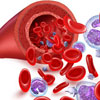New drug therapy for blood cancers
Clinical researchers at VCU Massey Cancer Center have successfully completed a Phase I clinical trial evaluating a combination of the drugs Bortezomib and Alvocidib in patients with relapsed or refractory blood cancers, paving the way for a Phase II clinical trial to test the safety and effectiveness of the new therapy.
Reported in the journal Clinical Cancer Research, the study determined the maximum tolerated dose with acceptable side effects for this novel drug combination. The trial represented the first time a proteasome inhibitor such as Bortezomib was combined with a cell cycle inhibitor such as Alvocidib to treat patients with cancer. Proteasome inhibitors work by blocking the action of proteasomes, which are large protein complexes that help destroy proteins that are no longer needed by the cell. Cell cycle inhibitors disrupt the sequence of events that allow cells to undergo cell division and duplication. They also have the ability to block gene transcription.
The trial included 16 patients who had either indolent (non-aggressive) non-Hodgkin’s lymphoma, mantle cell lymphoma or multiple myeloma. After they received the treatments over a 21-day cycle, there were two complete responses, meaning that all detectable traces of the cancer were gone, and five partial responses.
“Therapeutic responses tend to be rare in Phase I trials, but 44 percent of our patient sample responded to the therapy. Interestingly, some patients who previously had no response to Bortezomib, or progressed after Bortezomib therapy, responded to the combination,” says Beata Holkova, M.D., a hematologist-oncologist at VCU Massey and co-investigator on this clinical trial. “Because of the small patient sample size, we can’t draw definitive conclusions about the effectiveness of the therapy, but we were quite encouraged by the results.”
The patients received Bortezomib intravenously on days 1, 4, 8 and 11 and Alvocidib on days 1 and 8. Bortezomib’s therapeutic dose alone was not tested because it has already been established and approved to treat certain blood cancers. However, for Alvocidib, the researchers escalated the dose until the maximum tolerated dose was identified. The same researchers are also currently completing a second Phase I clinical trial testing a different delivery schedule of Alvocidib. Although not yet completed, the initial results of this trial appear comparable to the present study.
“This is one of the first trials of its type in which two targeted agents which interfere with two very different biological processes are being combined to treat patients with blood cancers,” says co-investigator Steven Grant, M.D., associate director for translational research, co-program leader of Developmental Therapeutics and professor of internal medicine at VCU Massey.
The rationale for this study was developed in Grant’s laboratory when synergistic interactions between proteasome and cell cycle inhibitors in malignant blood cancer cells were discovered by Yun Dai, M.D., Ph.D., associate professor of internal medicine at VCU Massey. This laboratory research established the basis for a V Foundation Translational Research Award, which with additional funding from the National Institutes of Health provided the resources necessary to translate the laboratory findings into clinical trials.
Moving forward, the researchers are working with the NCI to develop a Phase II clinical trial to test the effectiveness of this drug therapy. The trial will be conducted in collaboration with multiple institutions to compare the effectiveness of fixed doses of the drug combination in a larger patient population.
(Source: Virginia Commonwealth University: Clinical Cancer Research)
More information
 | For more information on blood, blood types, blood tests, and blood donation and transfusion, see Blood. |
 | For more information on cancer, including breast, prostate, kidney and stomach cancer, see Cancer: Overview. |
Dates
Tags
Created by:

 Login
Login














